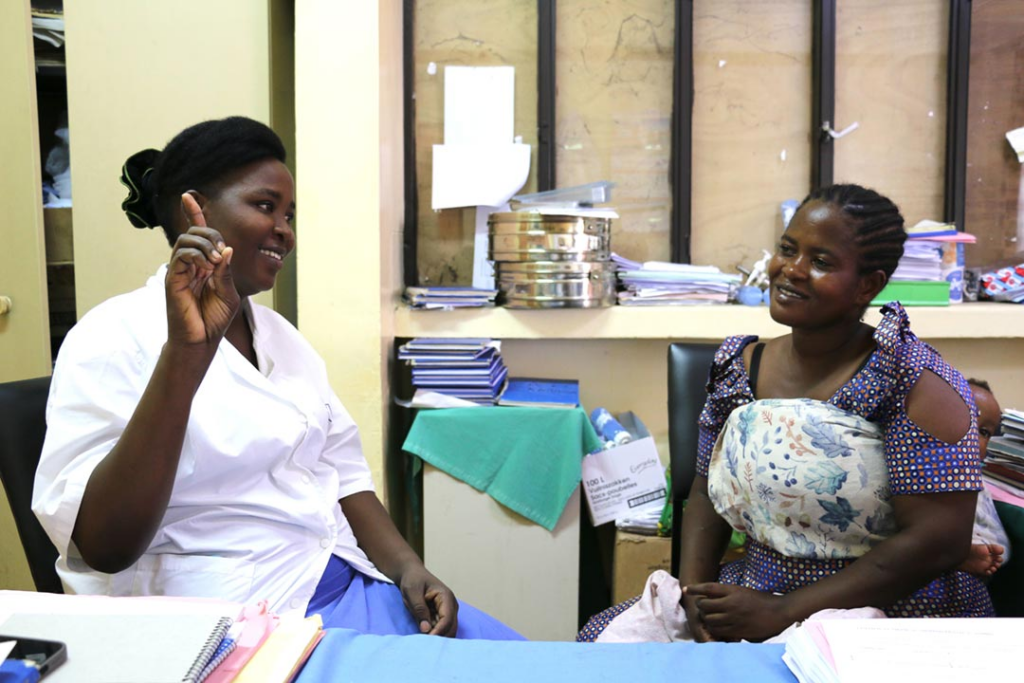In health care, access to information is often as important as access to medicines. Willy Kamugisha is trying to make sure deaf people aren’t left out.
By Moses Havyarimana
This article was originally published on May 27, 2024 by VaccinesWork

Burundi is striving to improve the quality and the accessibility of health services in the country. Several new hospitals have been built across the country since President Evariste Ndayishimiye took office in 2020 – a signal of the country’s commitment to providing care.
Burundi has been on an upward trajectory where health care is concerned for longer than that. According to the World Health Organization (WHO), Burundi’s life expectancy at birth improved by 20 years from 43.8 years in 2000 to 63.8 years in 2019. And it’s been more than a decade since the country’s government inaugurated a universal health access scheme for nationals, with mothers and pregnant women accessing care for free.
However, even if those public services are theoretically universal, certain minority groups have found access more difficult.
“I found that in the health sector, which is very crucial, the deaf face challenges when it comes to treatment. [Deaf] parents with children, they are not aware about the vaccination campaigns.”
– Willy Kamugisha, founder of “Accessible Sign Language Vision”
Burundi, a country of 12.9 million, is home to a deaf population estimated at between 60,000 and 136,000 people. Deaf patients are a group that have faced challenges, as nurses and doctors describe difficulty communicating with sign-language users.
That’s a problem Willy Kamugisha, a 38-year-old father and founder of an organisation in Burundi called “Accessible Sign Language Vision”–- which mainly focuses on teaching of sign language, and empowering the deaf to go into entrepreneurship – realised he could help with.
The organisation was founded in 2022. A few months later, Kamugisha inaugurated a volunteering programme that trained Burundian doctors and health workers in the use of sign language.
“I found that in the health sector, which is very crucial, the deaf face challenges when it comes to treatment,” said Kamugisha. “[Deaf] parents with children, they are not aware about the vaccination campaigns.”
According to Kamugisha, these challenges are most acutely experienced by women seeking a proper diagnosis. “Deaf women who have issues with their breasts or private parts find it very difficult to communicate, especially when they need an interpreter, who in most cases is a male,” he said.
Since the launch of his volunteering programme two years ago, Kamugisha says he has trained over 120 health workers countrywide. Despite financial challenges, he says he is dedicated to continuing this programme for the better of Burundi’s deaf community.
“Learning the sign language helped us a lot because sometimes the deaf come to receive treatment and they go back without receiving proper treatment because they couldn’t get someone to communicate to,” said Twagirayezu Jeannette , a paediatric and neonatology nurse at Centre Hospitalo-Universitaire de Kamenge – Roi Khaled, a public hospital in Bujumbura.
Twagirayezu reported that deaf patients are now getting proper attention and communication from her team.
“Though I received the training, there is need to be trained more in sign language, because we are not yet to that level where we can communicate perfectly. We will be more than happy if we get further training, as in our community we have many deaf people,” said Twagirayezu.
Burundi’s government is working to better accommodate the deaf, especially while communicating to the public. The country’s ministry of information and technology has obliged the country’s state broadcaster to include sign language during the news bulletins.
But there is still room for more efforts in the health sector, according to Justine Rugerinyange, a 35-year-old mother of three, and one of the deaf patients at the Roi Khaled hospital. “When I was pregnant for the first time, it was my friends and family that I always came with to this hospital to help translate. So sometimes there were misinterpretation,” said Rugerinyange. She said that back then, not even one doctor knew sign language.
“Sometimes doctors tried to write down what they wanted to communicate to me, but it wasn’t easy. In most cases my family and friends got to know some of my private life, but I had no choice but to go with them along to the doctor,” Rugerinyange recalled.
“What I realised is that now they try to communicate. But it is not enough – there is need for the government to include the sign language as part of the obligatory training for the doctors, to facilitate the deaf.”
“Some of the biggest challenges I face: we are financially strained, and there is need to sensitise doctors and health workers so that they understand how learning sign language is crucial. Funding challenges are normal, but there is a need to understand and [inspire] dedication to learning the sign language. With that we will make a difference in our community together,” said Kamugisha.
Apart from having initiated the project of training health workers about the using of sign language, Kamugisha is involved in the social activities with a local deaf association. The association meets to discuss critical issues affecting them in their everyday life, including health and access to health services.
